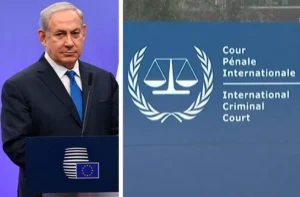An informant, a retired high school teacher at a Bavarian school, contacts one of the country’s leading newspapers. He has something that could interest the editors and is likely to destroy the reputation of a prominent politician. The “something” is a leaflet with sentences that have never been read by an official in the Federal Republic.
The sheet bears no signature, but the teacher is sure who the originator is: the Economics Minister and Deputy Prime Minister of the Free State of Bavaria. Nobody else would qualify. He could testify, but only anonymously. The teacher doesn’t want to get in trouble.
It’s a story every editor dreams of. Convicting a minister she doesn’t like, who’s rising in the polls with his party, of a crime, six weeks before the state elections. There’s just one small problem: Authorship can’t be proven, even after research swarmed by half a dozen reporters.
The leaflet affair is the worst possible accident for a press organ
The newspaper will later write that it has found several witnesses who have corroborated its account, but cannot say who they are. In fact, the paper did not really get beyond the information provided by the high school teacher during the research. Everything the editors know is essentially based on what he said. The newspaper is discussing how to proceed. Some experienced editors are uncomfortable. What if the information provided by the informant turns out to be incorrect?
The editors-in-chief nevertheless decide to make the story big, on the front page, with a photo of the suspect. It reads as if the guilt would be established. We know how things went on. Hubert Aiwanger has denied it, he had also denied it in detail to the “Süddeutsche Zeitung”, at least more extensively when it was then included in the text. Then the brother outed himself as the author of the scribbling. It is the greatest possible accident for a press organ: You accuse a politician of an act that they rightly describe as “outrageous” – and then you stand there blank when someone else names the perpetrator.
On Monday I opened the “Süddeutsche Zeitung” with excitement. I was expecting an explanation from the editor-in-chief. The last time an editor was so wrong was when the “Bild” accused the then Environment Minister Jürgen Trittin of a bolt cutter in his hand based on a photo from his student days. The mistake almost led to the dismissal of newly installed editor-in-chief Kai Diekmann and an immediate apology.
Only self-praise from the “SZ”: Even the “Bild” was already more remorseful
In the “SZ”, however: self-praise. The question of who wrote the pamphlet shrank to “one thing,” a side detail, on Monday. “In essence” they were right, Aiwanger finally admitted that at least one copy of the leaflet had been found in his satchel.
Then, on Tuesday, the editor-in-chief completely self-exculpated: The authorship is no longer important. The rest is terrible enough to warrant the minister’s immediate dismissal. “The authorship is no longer important”: This is another way of burying journalism in Germany.
You publish the worst imaginable accusation you can make of a politician. When the key accusation turns out to be false or unprovable, you simply say: But everything else was true. How to call that? “Campaign journalism” is too weak a word. There are many campaigns in journalism, but a campaign doesn’t mean that you can throw unproven allegations around.
How should one actually call this journalism against Aiwanger?
Even “suspicious journalism” is not enough. Perhaps one should speak of “SZ journalism”. When the Aiwanger case is later discussed at journalism schools, this formulation would suggest a new understanding of press freedom.
There could have been other options. One could have reported what speaks for and against the chairman of the Free Voters in Bavaria. This genre is called suspicious reporting. Someone is accused of misbehaving or possibly even criminal behavior. There are many indications that the allegations are correct, but the ultimate proof cannot be provided. So you inform the reader about the status of the research, also about doubts and objections.
But that was the “SZ” too small. She really wanted to get rid of the Bavarian Economics Minister. Therefore, a text was chosen for publication in which his appearances during the election campaign were first described. From now on, every sentence that Hubert Aiwanger said or will say in the future should be read against the background of the leaflet. That was the intention, which is why the claim of authorship was so important.
I also think Aiwanger’s actions are clumsy – but he is not responsible for bringing the game
Do I find Hubert Aiwanger’s explanations insufficient? Yes, I think so. I think his actions are confused and contradictory. Can one doubt the story with the brother as the author? This can be. But it is not the accused’s job to prove that the allegations against him are unfounded. It is the accuser’s job to prove that what he claims is true.
Some are now acting as if it doesn’t really matter who typed the infamous lines, the older or the younger brother. A personal union of guilt. We should consider carefully whether we want to follow this line of reasoning. Anyone who deviates from the concrete attribution of the crime ends up in the devil’s kitchen.
You can see in the US where it leads when newsrooms become part of the political struggle. Then you end up in the trenches of channels like Fox News and MSNBC, where everything is judged only on whether it helps or hurts the agenda. You let your own people get away with every misdemeanor, but you can confidently accuse the enemy of all kinds of misdeeds.
The “Süddeutsche” was not the only editorial office that was in possession of the leaflet, that should not go unmentioned. The “Spiegel” also had a copy. I happen to know the editor who was in charge of the research there. Without being too indiscreet, I can say that you don’t have to help him onto his horse when he goes to the right. But in this case, after careful examination, he advised against publication. He ruled that the allegations did not meet the minimum standards for reporting suspicions.
What is taken seriously in the “SZ” and not in the “Spiegel”.
It speaks for the editor-in-chief of the “Spiegel” to have trusted the judgment of their editor. I know the hunting fever that editorial departments can get, especially when they fear being left behind by the competition. Keeping a cool head here is a quality that characterizes an editor-in-chief – and that distinguishes that of the “Spiegel” from that of the “Süddeutsche Zeitung”.
Many years ago, as a young professional, I completed a longer internship at the “Abendzeitung” in Munich. As circumstances would have it, the editorial offices of the “SZ” were right next door on Sendlinger Strasse. That was before some gray men in Stuttgart ordered the move to the outskirts. Of course, the “Abendzeitung” looked with awe at the colleagues at the big paper.
One of the phrases I learned during my internship was the mocking wisdom of the tabloid trade: “It must have been like this. It will have been like that. It was like that.” The tragic thing about the “Süddeutsche” is that she takes this sentence seriously without being able to admit it.
Read all of Jan Fleischhauer’s columns here.
Source: https://www.focus.de/politik/deutschland/die-focus-kolumne-von-jan-fleischhauer-jetzt-wird-es-gefaehrlich_id_203416566.html


